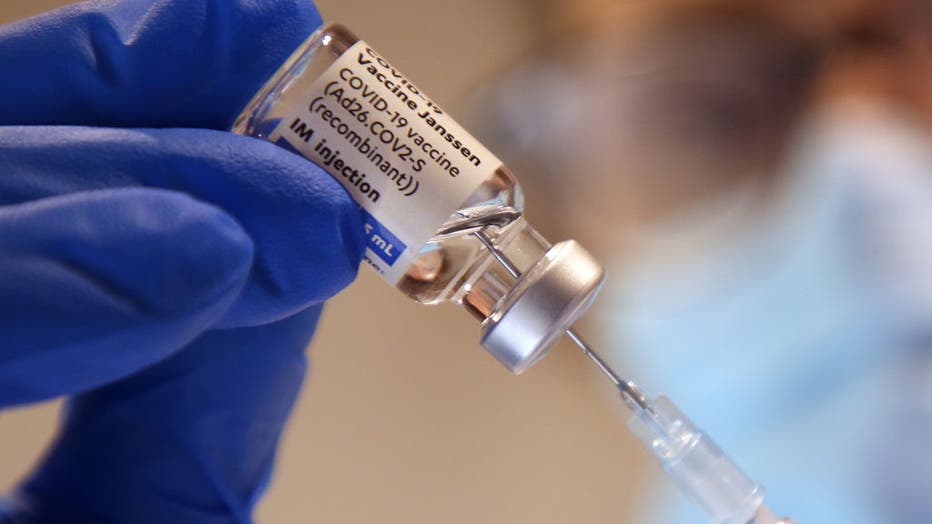J&J COVID-19 booster 94% effective 2 months after 1st shot, company says
LONDON - Johnson & Johnson’s booster dose of its vaccine was found to be 94% effective against symptomatic COVID-19 in the United States when administered two months after the first shot, the company announced on Tuesday.
The company shared new data from its late-stage clinical trial, which also showed that the J&J booster two months later increased antibody levels four to six times higher than after just the single dose for adults ages 18 to 55.
When given a J&J booster dose six months after the single shot, antibody levels "increased nine-fold one week after the booster and continued to climb to 12-fold higher four weeks after the booster" — regardless of age, the company said.
The study's results have not yet been peer-reviewed.
"Our single-shot vaccine generates strong immune responses and long-lasting immune memory. And, when a booster of the Johnson & Johnson COVID-19 vaccine is given, the strength of protection against COVID-19 further increases," Dr. Mathai Mammen, the global head of research and development at Janssen, said in a statement.
While the extra dose of J&J’s vaccine was found to be 94% effective at preventing moderate to severe COVID-19 in the U.S., it was found to be 75% effective globally, the company reported — a difference likely due to which variants were circulating in different countries during the months-long study.
When given as a booster, the J&J vaccine was well-tolerated with side effects generally consistent with those reported after the initial dose, the company said.

FILE - A physician's assistant draws up a shot of Johnson & Johnson's COVID-19 vaccine in a primary care physician's office. (Photo by Wolfgang Kumm/picture alliance via Getty Images)
The company previously published data showing its one-shot dose provided protection for up to eight months after immunization. It also pointed to recent real-world data showing 79% protection against coronavirus infection and 81% protection against COVID-19 hospitalization in the U.S. even as the extra-contagious delta variant began spreading.
J&J said it has provided the data to regulators including the U.S. Food and Drug Administration, the European Medicines Agency and others to inform decisions about boosters.
While the single-dose vaccine remains strongly effective, "a booster shot further increases protection against COVID-19 and is expected to extend the duration of protection significantly," Dr. Paul Stoffels, J&J's chief scientific officer, said in the statement.
The findings come amid a push for booster shots from the Biden administration, looking to shore up Americans’ protection against the virus now being fueled by the highly contagious delta variant.
On Friday, an independent advisory panel for the U.S. Food and Drug Administration rejected a plan to give Pfizer-BioNTech COVID-19 booster shots to all of those 16 and up — and instead endorsed the extra vaccine dose only for those who are 65 or older or run a high risk of severe disease.
RELATED: Biden will get COVID-19 booster shot on camera, White House says
But the nonbinding recommendation is not the last word. The FDA will consider the group’s advice and make its own decision, probably within days. And the Centers for Disease Control and Prevention is set to weigh in this week.
The FDA and CDC will also most likely decide at some later point whether people who received the Moderna or J&J shots should get boosters.
According to CDC data, 14.8 million Americans have been inoculated with the J&J single-dose COVID-19 vaccine. In comparison, 110 million Americans are now fully vaccinated with Pfizer’s two-dose shot, and another 74.9 million with Moderna’s two-dose vaccine.
RELATED: COVID-19 boosters likely to be expanded in coming weeks, US health officials predict
Meanwhile, World Health Organization has urged rich countries to stop giving booster doses until at least the end of the year, saying vaccines should immediately be redirected to Africa — where fewer than 4% of the population is fully vaccinated.
Last week in the journal Lancet, top scientists from the WHO and FDA argued that the average person doesn't need a booster shot and that the authorized vaccines to date provide strong protection against severe COVID-19, hospitalization and death.
RELATED: Pfizer: COVID-19 vaccine works in kids ages 5 to 11, plans to seek authorization soon
This story was reported from Cincinnati. The Associated Press contributed.

